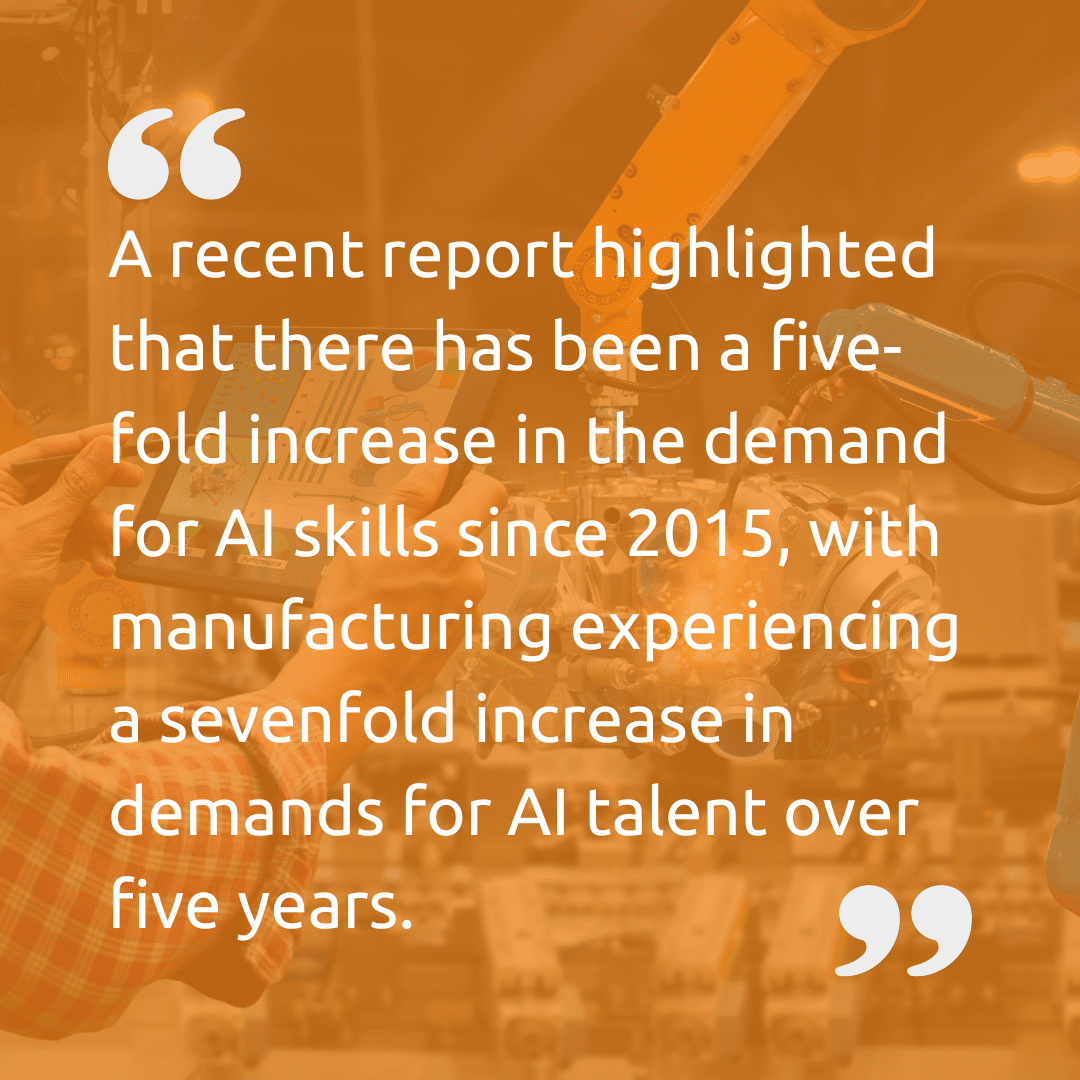The integration of AI into industrial automation has significantly improved efficiency and safety in the sector. However, as the industry advances, the demand for skilled industrial automation engineers has surged, leading to several hiring challenges. This article delves into these challenges, their impacts on the industry, and potential strategies to address them.

Skill shortages and rising demand
The exponential growth of AI and automation has created a critical shortage of skilled professionals. A recent report highlighted that there has been a five-fold increase in the demand for AI skills since 2015, with manufacturing experiencing a sevenfold increase in demand for AI talent over five years . However, there is a lack of qualified engineers to meet this demand.
The key challenges in hiring
- Unrealistic Job Requirements: Many companies struggle with “qualification creep,” where job listings have unrealistic minimum qualifications. Candidates feel underqualified despite having relevant experience, so they don’t apply. Many job seekers say job descriptions often demand skills they don’t need or can learn on the job.
- Lack of Clear Job Descriptions: Companies often fail to articulate the specific skills and responsibilities associated with new automation roles. Lack of clarity leads to job seekers not knowing what the job entails and whether they’re qualified. Roles and skills change as automation technologies evolve, so it’s tough to define job descriptions accurately.
- Extended Recruitment Processes: The hiring process for industrial automation engineers tends to be longer compared to other roles. The average recruitment process for Tech-AI roles takes 56 days, compared to 47 days for general IT jobs. This delay can deter highly sought-after candidates who may receive offers from other companies willing to move faster.
- Geographical Disparities: The supply of AI professionals is unevenly distributed, with key tech hubs across the globe hosting a significant portion of the talent . Talent concentration forces companies outside of these regions to either offer remote work or relocate candidates, which can be difficult and expensive.
- Confidence Issues Among Job Seekers: A survey by Unmudl revealed that many job seekers feel doubtful about their ability to secure a job in the current market, citing a lack of skills as a major barrier. This lack of confidence can reduce the number of applications companies receive, exacerbating the talent shortage.
Impact on Growth and Competition
Companies and the industry are set to suffer due to the difficulty in hiring skilled industrial automation engineers:
- Slower Innovation: Companies may struggle to implement advanced AI solutions promptly, slowing down innovation and reducing their competitive edge .
- Increased Costs: The high demand for scarce skills drives up wages, increasing operational costs for companies. This is especially challenging for smaller firms competing with larger enterprises .
- Competitive Disadvantage: Firms unable to attract and retain top talent may fall behind in adopting new technologies, leading to a loss of market share and profitability .
Strategies to Address Hiring Challenges
- Improving Job Descriptions: Companies should strive to provide clear, realistic job descriptions that accurately reflect the skills needed for the role. You should distinguish between essential and desirable skills and show a transparent view of the job’s evolution.
- Investing in Training and Development: By offering robust training programs, companies can upskill their existing workforce, reducing reliance on external hiring. Training programs should cover both technical and soft skills to create well-rounded, long-term team players.
- Embracing Remote Work: Remote and hybrid work models can help companies tap into a broader talent pool. It’s especially useful for regions with limited local talent, allowing companies to hire skilled professionals across the globe.
- Fostering Collaborative Leadership: Companies should develop leaders who can bridge the gap between technical and soft skills. They can help manage AI teams effectively, ensuring projects stay on track regardless of skill shortages.
- Partnering with Educational Institutions: Collaborations with universities and technical schools can create a pipeline of future talent. Internships, research partnerships, and scholarships can get students interested in industrial automation and AI.
Navigating the Talent Shortage with Specialist Support
Although hiring industrial automation engineers is challenging, it’s not impossible. The best way to mitigate these challenges is to adopt strategic approaches to recruitment, training, and leadership development. Specialist engineering recruitment companies like Darwin help businesses navigate talent shortages and build hiring strategies for long-term success. Addressing these issues is crucial for maintaining growth, competitiveness, and technological advancement in this rapidly evolving field.
References:
Lepistö, J. (2024, January 5). AI is Changing Industrial Automation. LinkedIn.
- NVIDIA. (2024, March 19). NVIDIA Real-Time AI Industrial Automation: Next Phase. IoT Tech News.
- Koutroumpis, P. (2023, October 9). Expert Comment: AI Demand is Booming for the Right Skills and for the Technology ‘Glue-Guys’. Oxford Martin Programme on Technological and Economic Change.
- Secard, R. (2024, March 7). Why Skilled Automation Engineers Aren’t Applying for your Job Openings. IndustryWeek.
- Ramsay, J., & Spencer, G. (2023, December 8). 5 of the Biggest Challenges of IT Engineering Recruitment. MRJ Recruitment.
If you too are struggling to find industrial automation engineers, email or message me so I can help you with you hiring needs.
Alternatively, if you are looking for a job within Industrial automation, click this link.
To catch up on other Automation blogs, click either link:





